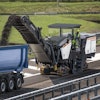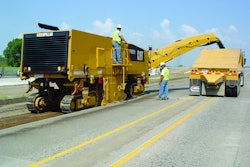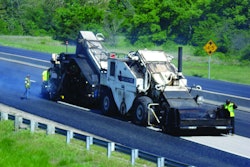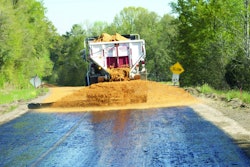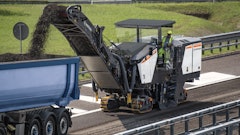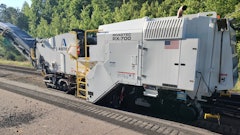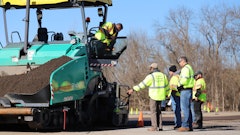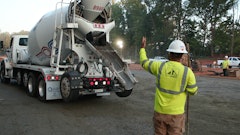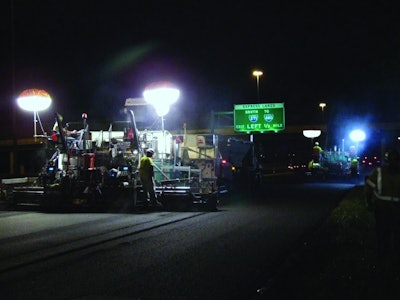
In 2009, The Shelly Company, an Old Castle Materials Company, was awarded a project funded by the Recovery Act - a nearly $9 million project to modernize and resurface Ohio's Interstate 271 between Wilson Mills Road and Interstate 90. In 2010, the company earned the National Asphalt Pavement Association's Quality in Construction Award for the project, which they received at the recent NAPA Annual Meeting in Orlando this past February.
The I-271 project spanned both Northeast Ohio's Cuyahoga and Lake Counties and was the fifth phase in a series of five projects which began in 2006 to modernize the I-271 mainline corridor between Summit/Cuyahoga County line and I-90. The project, administered by ODOT in coordination with contractor, The Shelly Company, closed multiple lanes of I-271 during the overnight hours between approximately 7 p.m. and 7 a.m. weekdays.
Beginning in August 2009, the bulk of the work was completed by December 2009, however some minor operations including guardrail operations, clean-up, seeding, mulching, etc. continued through summer 2010.
The project
I-271 had severe joint cracking and longitudinal failures, and the underlying concrete was in bad repair, says Robert Galardini, project manager, with The Shelly Company.
To correct the problems, The Shelly Company milled 3 ½ inches in Cuyahoga County and 2 inches in Lake County. "The key to this project was the milling of asphalt with the intent to leave a ½ inch covering the existing concrete due to the poor condition of the existing concrete," says Galardini.
Shelly changed the maintenance of the traffic plan so the project could be worked in four quadrants, two being simultaneous northbound and southbound. This allowed the paving to follow directly behind the milling, says Galardini.
Paving included two lifts of 19mm in Cuyahoga County and one lift in Lake County. The project was paved with two pavers, 34 feet wide in lanes one and two with a 10-foot shoulder. The remainder was paved 22 feet wide with one paver in lane three and a 10-foot shoulder.
The same paver spreads were used on the surface, says Galardini. Paver speed was 24 feet per minute (fpm) at 34 feet wide at around 525 tons per hour (tph). At 22-feet-wide, the paver speed was 34 fpm and 484 tph. Surface course speeds were 22 fpm for both 34-foot and 22-foot passes.
A Topcon Paver System 5 was used on all lifts and passes. Compaction equipment included two double-drum rollers for breakdown passes, two for intermediate and one unit for finish rolling. This was cut back to four rollers for the 22-foot pass.
There was a total of 63,000 tons of RAP milled on the project, which was introduced back into the mix; a grand total of 89,000 tons of asphalt was placed. Because the job took place in two separate counties, it had several different thicknesses and elevations that the company had to contend with. Some sections were milled deeper than others. Equipment used on the I-271 project included a Wirtgen W2000 milling machine; a Vogele 5200-2 paver; a Cat AP 1000B paver; and a Terex/Cedarapids CR662 RM material transfer vehicle.
The challenges
As mentioned, the work on the I-271 project was done at night. The Shelly Company closed multiple lanes of the interstate during the overnight hours between 7 p.m. and 7 a.m. on weekdays.
"We had three lanes of traffic to pave as well as two slip ramps from the express lanes," says Galardini. "We had seven ramps to contend with, plus two of the ramps were on two-lane major highways that had to be maintained and paved through."
To pave such a high volume in tight time constraints, The Shelly Company had to coordinate a lot of pieces of equipment and personnel.
"We had up to 80 trucks running at times - 40 for milling and 40 for paving," says Galardini. "All the lanes had to be open by 6 a.m. or we'd face a penalty. On nights that we were paving 34 feet wide, we were unable to close the second lane until 9 p.m., leaving us only eight hours to pave. We still managed to lay down anywhere from 4,000 to 4,700 tons at 1.75 inches, stripe the lanes, remove the traffic zones and open by 6 a.m."
Another challenge Galardini mentions was parking the paver at night set at a 22-foot-wide fixed paving width. "There are not many areas to park that type of unit with traffic in the median express lanes," he says.
According to ODOT Project Engineer Mark M. Sakian, P.E., "It was probably one of the smoothest run projects I've been involved with. We had good weather and very little rain and lost days. The Shelly Company really attacked the job and it went more quickly and smoothly than most Interstate jobs I've been a part of. The biggest challenge was making sure to keep the road clean to eliminate vehicle damage and claims. It was in everyone's interest to complete the project as quickly as possible.
"We had a window near the end of the construction season with unseasonably warm weather, so we were able to complete work which would have normally been performed the following year," Sakian continues.
“The Shelly Company initiated a quality improvement initiative last year,” said David Rauh, president of the Shelly Group. “This project is a direct result of refocusing our team on producing a quality product every day.”
Galardini believes the project won the Quality in Construction Award from NAPA because of the challenges faced and overcome, as well as the amount of paving completed in a short time period. "The ride and density numbers were extremely impressive as well," he says. "We captured 89% smoothness incentive and had 1.04 pay factor in density."
The Shelly Company is part of the Materials Division of Oldcastle Inc., a leading supplier of aggregates, asphalt, ready mix concrete and paving services in the United States, with more than 1,400 locations nationwide. Headquartered in Thornville, OH, the company has offices located in Columbus, Findlay, Twinsburg, Toledo, Dover and Marietta. The company features 41 asphalt plants, 45 aggregate operations, 29 ready mix concrete plants, seven rail depots, a barging and unloading operation on the Ohio River, and numerous paving and road construction operations.

